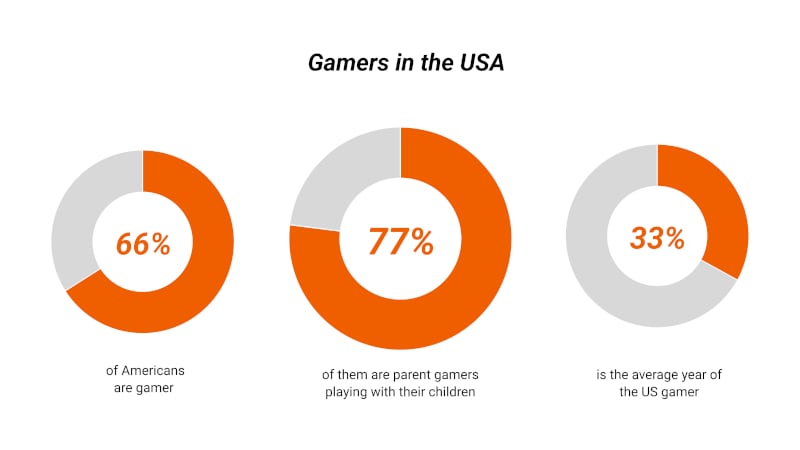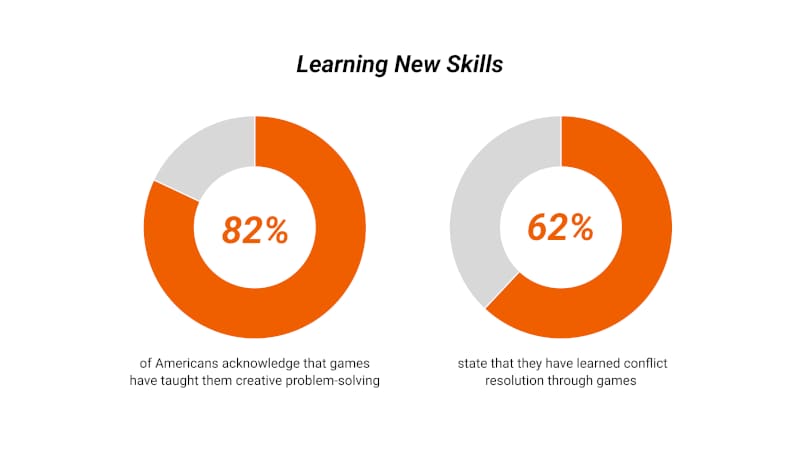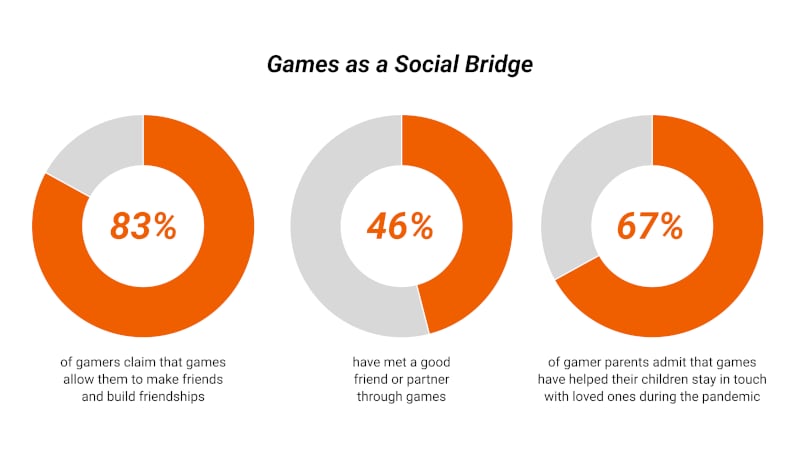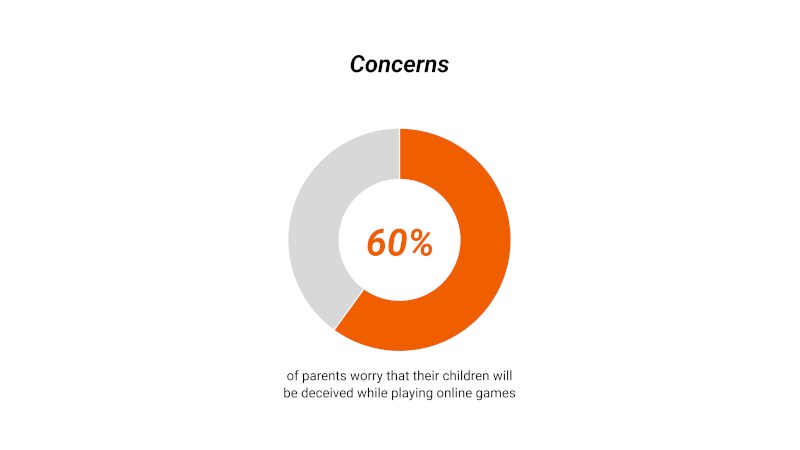The history of video games as we know them today dates back to the 1970s. Many adults have been accompanied by games since their childhood [I], and despite the passing years, they have not given up their hobby (the average age of a statistical gamer is 33 years old [II]. Many of them even try to introduce their children to gaming. In response to this need, creators strive to develop family-friendly video games.
Similar to movies, video games serve as an excellent intergenerational bridge, enabling better understanding of children. Playing together can be a great way to spend time, a topic of conversation, and a hobby that unites the whole family and overcomes cross-generational barriers. The upcoming summer break is a perfect opportunity to try gaming together!
The Power of Intergenerational Gaming
According to research conducted by the Entertainment Software Association, as much as 66% of Americans are gamers [III], and among them, 77% of parents play games with their children [IV]. Why are these numbers so high? It’s because, as mentioned before, gaming together has many positive effects:
- Fostering communication and bonding – Intergenerational gaming greatly influences communication and strengthens bonds. Among the surveyed individuals, as much as 83% claim that games are an effective way to meet people and make friends [V]. So why not get to know and befriend your own family members better? [VI]
- Creating shared memories and experiences – Playing together with a child is crucial as it brings you closer and builds a healthy relationship, which will turn into fond memories of childhood in the future [VII]. 59% of surveyed parents agree that shared hobbies also provide numerous topics for conversations [VIII]. Additionally, if, for various reasons, you cannot afford to go on a trip this year, gaming together can be a wonderful summer adventure.
- Learning new skills and strategies – It’s no secret that games teach and develop skills, as agreed upon by 89% of surveyed parents [IX]. Some titles can ignite children’s passion for history, geography, or maths. They can spark a love for automobiles or foreign languages in young minds. Games can also teach strategic and logical thinking [X].
- Promoting cognitive health – Besides learning, games can positively impact children’s cognitive functions such as perception, thinking, decision-making, and memory. 91% of surveyed gamers agree that games provide mental stimulation [XI]. Thanks to games, even during the holidays, your child’s mind will remain active, which will make the return to school after the summer break much easier.
In addition to strengthening family bonds, building shared memories, and promoting learning, video games also play a significant role in enhancing children’s life skills that will benefit them in adulthood:
- Improving problem-solving and critical thinking abilities – Many real-life situations require critical thinking and problem-solving skills. These are quite challenging skills to master, but they can be easily learned through gaming. 82% of surveyed Americans admit to learning creative problem-solving thanks to games [XII].
- Encouraging teamwork and cooperation – Teamwork is an important skill that is useful in school, work, and personal life. Through gaming, children can easily understand the concept of cooperation and its significance. Games are also a great way to teach children conflict resolution skills (confirmed by 63% of respondents [XIII].
- Boosting hand-eye coordination and spatial awareness – In addition to cognitive functions, video games also develop dexterity and spatial awareness. They also help boost hand-eye coordination, which is crucial for children but can often be challenging. Learning through play is an excellent choice in this case!
- Exploring creativity and imagination – Last but not least… Video games are excellent tools for fostering creativity and imagination. Exploring in-game worlds, creatively solving quests, crafting, building – all of these significantly stimulate creative skills.
The Top Family Video Games
There are plenty of various games for children and whole families. Let’s have a look at some of the most popular family games recommended by the creators themselves!
Set in the iconic Mario Bros universe, this racing game is a great choice for playing with children. The mechanics are extremely simple – players take on their favourite characters and participate in races, collecting coins and boosters along the way. The game is rated PEGI 3+, meaning it’s ideal for the youngest players. The races will teach them coordination, dexterity, teamwork [XIV], as well as fair competition, winning, and losing.
The Mario series is one of Nintendo’s exclusives, which means this game is intended for users of the Nintendo Switch console (or in the case of Mario Kart 8, the Wii U).
Note: PEGI stands for Pan European Game Information, which is the European video game content rating system. You can read more about it here.
Minecraft is a decade-old survival game with an open world and crafting/building elements. Players can gather resources, explore the world, build homes, and raise animals, among other activities.
The game is rated PEGI 7+, but even younger players can try their hand at this title with the guidance of their parents. Minecraft will teach them creativity, critical and strategic thinking, and collaboration.
Initially released on PC, Minecraft is now available on consoles such as PlayStation, Xbox, Nintendo, and mobile devices.
This dynamic, two-player platformer-action game provides excellent entertainment for both children and parents. The gameplay revolves around defending a space station from alien attacks.
The game is suitable for children aged 7+ as it requires a bit more skill. It’s a title that will teach your child cooperation, strategic and quick thinking, problem-solving, and planning. It will also improve their coordination and dexterity.
The game has been released on PC, PS4, Xbox One, and Switch, so you can easily purchase and download it on your device.
- Snipperclips: Cut It Out
This is a great family-friendly game that involves creatively solving various puzzles. It’s a title designed for two players, and it can sometimes be a head-scratcher to overcome the next level.
The game is rated PEGI 3+, which means it’s perfectly tailored to the needs of the youngest players. Together with their parents, kids can learn logical thinking, creativity, stimulate their imagination, and develop strategic thinking.
The game, like the previously mentioned Mario Kart 8 Deluxe, is available on the Nintendo Switch console.
What else can you play as a family?
These four games are just the beginning of the list of family-friendly video games! Racing games (preferred by 38% of surveyed players), platformers and arcade games (57% of players), building-based simulators (41% of players), puzzles (65%), strategy games (40%) and for older children, beat’em up games (30%) and some FPS (42% of surveyed players) are also suitable [XV].
To find the right games for your children, always check the PEGI (and ESRB) rating, indicating the age threshold set by the developers. Pay attention to additional labels such as “E” which means the game is suitable for everyone. Furthermore, make sure that children’s games do not have labels like “Strong Language,” “Violence,” etc.
Ensuring a Positive Gaming Environment
Games can be excellent educational tools and a wonderful way to spend the summer break together. However, it’s important to remember that along with entertainment and fun, there must also be certain responsibilities and rules that should be instilled in children from a young age [XVI].
- Setting screen time limits – Video games can be incredibly addictive, and some titles can consume hours of a player’s time. Therefore, setting screen time limits (e.g., 2–3 hours per day)[XVII] for both children and parents is one of the key rules for family gaming. During holiday periods, these limits can be extended slightly, but consistency is significant.
- Promoting respectful and ethical gaming behaviour – Everyone can get carried away by emotions at times. It’s essential to teach children not only the skill of losing gracefully but also emotional control and respect for other players.
- Understanding and mitigating the risks of online gaming – According to statistics from Lloyds Bank’s Fraud Prevention, 60% of parents fear the possibility that their children could become victims of fraud while playing games online [XVIII]. Instead of living in fear, it’s important to have conversations with children and make them aware of potential dangers lurking online. Teaching children caution and defence mechanisms in such situations is crucial.
- Balancing gaming time with other activities and responsibilities – Children love playing, and if parents allow it, they might want to spend their entire summer break in front of a screen. In addition to screen time limits, it’s important to make children aware of other responsibilities and engage them in shared activities. Establishing times for preparing and eating meals, cleaning up, and encouraging them to play outdoors are all essential.
Tips for Getting Started as a Family
To ensure that the summer break spent on gaming together is fun and beneficial for the whole family, it’s critical to prepare and establish certain aspects. Where should you start?
- Select the right games based on age, interests, and skill levels – The first step should be choosing a game library that is suitable for the entire family. When making a selection, consider the age of the children, as well as their interests and skills [XIX]. You can find interesting titles and a guide for choosing appropriate games in “The Top Family Video Games” section (see above).
- Establish a regular gaming schedule for family game nights – If you don’t want your family to spend the entire summer break in front of a screen, create a plan. For example, you can plan that Friday or Saturday nights will be your pizza and family game nights, or dedicate 1–2 hours each day to playing together. It all depends on you. However, remember to be consistent and regular.
- Make gaming a social experience – Gaming is not just about playing alone against the computer. Make playing together an engaging, enriching hobby and a bridge to socializing with peers. Consider inviting family members or neighbours to play together. The rich world of gaming also includes various conventions that the whole family can attend, board games that stimulate imagination, and many other side activities that will boost children’s confidence and allow them to meet peers.
- Encourage everyone to take turns leading the gaming sessions – Forcing children into certain activities results in reluctance, rebellion, and lack of engagement. If you don’t want your children to treat family game nights as an obligation but approach them with enthusiasm, involve them in the planning process! Let a different family member decide what to play each time. Ask children what game they feel like playing, which system to use, who should compete against whom – let them actively participate in decision-making and leading the gaming sessions.
Conclusion
In conclusion, video games bring many benefits to both children and parents. They can provide fun and teach various life and social skills such as teamwork, planning, and strategic thinking. They can also enhance creativity and imagination, as well as be a great way to spend quality time with the family. Through games, effective parenting and strengthening of bonds with children can be achieved, especially during summer break periods, when the whole family can spend their whole days together.
Above all, games are a great form of entertainment and a medium that can teleport your entire family to a magical world. So, how are you going to spend this year’s holidays? By the seaside, or in one of the worlds straight out of a dream?













